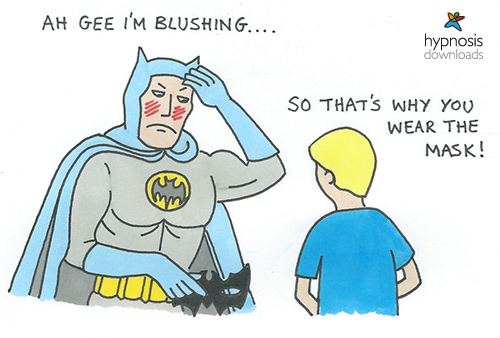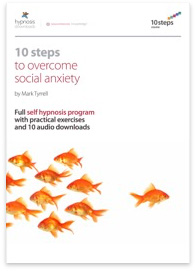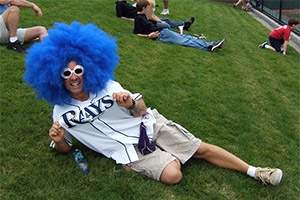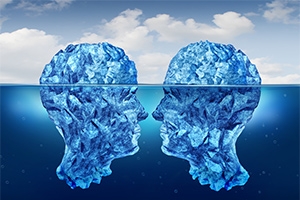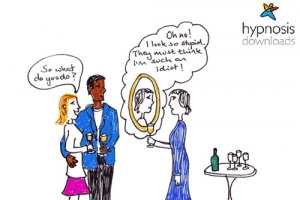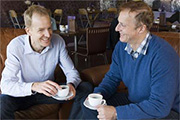5 Nifty Tips to Stop Blushing
Learn 5 psychological tricks to stop blushing in its tracks
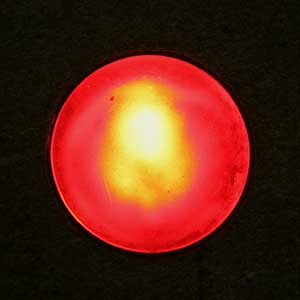 "5 Nifty Tips to Stop Blushing" courtesy of Mr. T in DC
"5 Nifty Tips to Stop Blushing" courtesy of Mr. T in DCOh no! I could feel it happening. Suddenly all the attention was on me! That horrible burning feeling in my face, can they tell?
"This is Mark," said my new teacher. "He's new here and I'm sure you're all going to help him settle in quickly!"
That was the first time I recall blushing. Later, some of my newfound classmates were kind enough to point out to me gleefully that I had blushed, and for a little while I was known as 'blusher'.
Fast-forward twenty-five years. A client sits in front of me. Robert is thirty-five and tells me that he's blushed all his life. He says woefully that he's seen dozens of therapists, many of whom told him why he might have started blushing (therapists love to find causes for things), but all he wanted was to actually stop blushing.
Prefer to watch instead?
Robert had become stuck in a vicious cycle: he blushed when he was embarrassed, then became embarrassed because he was blushing! So he blushed some more. Recent research shows that the more we think we are blushing, the more we blush (1).
When he came to me, he was blushing during situations and times when he didn't even feel embarrassed.
"Now I'm blushing just because I've told myself I might blush!" he said, looking at me with despair.
Here are five of the strategies I gave Robert that helped reduce, then eventually stop, the blushing that had been plaguing him for years:
1) Stop the blushing cycle by 'unmasking'.
One way to short-circuit blushing is to draw attention to it yourself. Yes, really. When you do this, the results can be amazing.
Blushing seems to be nature's way of disclosing our true feelings. If, for example, I say I am not attracted to someone when in fact I am, I may blush. If we were totally shameless, we wouldn't blush; but blushers tend to feel ashamed or embarrassed where others don't. Feelings of being 'on display' also cause blushing.
I very rarely blush nowadays; however, for some reason I did blush once when speaking to around thirty people. But I was, excuse the pun, cool about the blushing. I said: "Oh, I don't believe it! Look, I'm blushing!"
Actually, no one was very interested but I noticed that now I had 'unmasked' the blushing myself, it had nowhere to run and stopped immediately. Blushers blush because of the fear of being seen differently from how they want to be perceived.
I realize this might not be acceptable in an important business meeting, but give this strategy serious consideration because it does short-circuit the whole thing. And it fits in nicely with the next tip.
2) Stop feeling so responsible for blushing
In the example I gave in Tip 1, I said that I was 'cool about blushing'. Why did I not feel embarrassed about changing from my usual pallid complexion to someone resembling a neon light advertising one of Amsterdam's more dubious establishments?
It's amazing how people feel consciously responsible for stuff that is actually generated by their unconscious mind. For example, I have much more conscious control over whether I speak rudely to someone than whether I blush or hiccup or blink.
Separate your conscious and unconscious processes. For conscious stuff, I (at least try to) take responsibility, but unconscious stuff has nothing to do with me, mate! So I felt cool about the fact I was blushing.
It's your unconscious mind that has been producing the blood changes that lead to blushing, not your conscious mind. So really think about how much responsibility you need to feel for it. If your dog barks at a kindly stranger, you may feel responsible, but it's your dog, not you, that barked. Really thinking about this will make Tip 1 much easier to enact.
For Robert, this idea (delivered before and during hypnosis) was a major turning point. But there's an even more powerful way to stop blushing.
3) Stop blushing by learning to direct your blood flow
What? Am I crazy? Well, perhaps a little, but blood flow can be controlled through the use of the imagination. By spending five minutes daily imagining your hands heating up around an open fire, you'll find you can easily direct more blood into your hands (2).
I taught Robert that he could actually have some control over the temperature in different parts of his body. By focussing on his hands heating up during times when he might typically blush, he found he could actually stop himself blushing. It's as if the blushing was still there, but only in the hands. And pretty soon, he didn't even have to do this. But there's something else that he did and it's something you can do too...
4) Stop blushing by mentally rehearsing staying cool
Your body responds to preparation. What do I mean? Well, if you prepare for an event by feeling nervous when you imagine it, then this will prime your mind and body to actually feel nervous when the situation occurs.
If, on the other hand, you imagine upcoming events while feeling very relaxed, and imagine seeing yourself (from the outside) looking calm and cool, you are sending your unconscious mind and your body a powerful signal to actually be calm and cool in these situations.
This is a form of self-hypnosis and Robert got very good at this, too. Think about typical times you might blush. When you are very relaxed, breathing deeply, imagine watching yourself in those situations looking calm and cool. The more often and powerfully you do this, the more automatic keeping cool will become. You can even imagine a beautiful cool breeze sweeping across you in these times.
And lastly...
5) How to stop blushing by rewriting history
Spend time thinking about times you blushed in the past that are really memorable (because their unpleasantness stands out).
Now revisit some of these times in your mind, with eyes closed, from a detached perspective,just watching yourself in those times. Now realize that you can change those memories. Watch those past situations in your mind as if they had been fine and you had either relaxed totally about the fact you blushed or you didn't blush at all and remained cool and relaxed.
This 'rewriting history' exercise sends the message to your unconscious mind that, actually, there is no real history of blushing. Your conscious mind will still know you blushed in these times, but your unconscious mind will start to feel as if the pattern had never become established.
I heard from Robert recently. He told me that in the four years since we worked together, he had blushed only three times and had actually been so relaxed about it that he had laughed when it happened. Just as laughing at a bully can diminish their power, he now felt that blushing had no power over him whatsoever.
All those years ago, I blushed in the classroom and felt embarrassed. Now I hardly ever blush and know that if it were to happen, I really don't care. Power indeed.
10 Steps to Overcome Social Anxiety course
If just the thought of small talk makes you nervous, and social situations make you feel ill, then read on to find out how you can become socially confident and relaxed...
Get a free hypnosis session with our new Social Anxiety app for iOS & Android:
Includes our most popular social anxiety session free, with the option to upgrade to 10 more sessions.
Get the Social Anxiety app for iOS (iPhone or iPad) here or for Android here.
References
- Corine Dijk and colleagues recruited one hundred undergrads who'd been selected from a larger pool based on their scores on a blushing questionnaire: 50 of them were highly fearful of blushing, whereas the other 50 had little or no fear of blushing.
The participants' task was to make conversation with two strangers for five minutes. Throughout, the participants were wired up to physiological measures of their facial skin temperature and colour. The main findings were that giving the participants false feedback that they were blushing actually caused them to blush more and led them to think they'd be more negatively rated by the students with whom they had to make conversation. This was true for both groups of participants - those scared of blushing and those not fearful of blushing. - The Department of Physiology, University of Helsinki, Helsinki, Finland found in a series of six experimental sessions that subjects instructed to imagine their hand in a hot and cold water stream could reliably change blood flow, and therefore heat, with this method.

